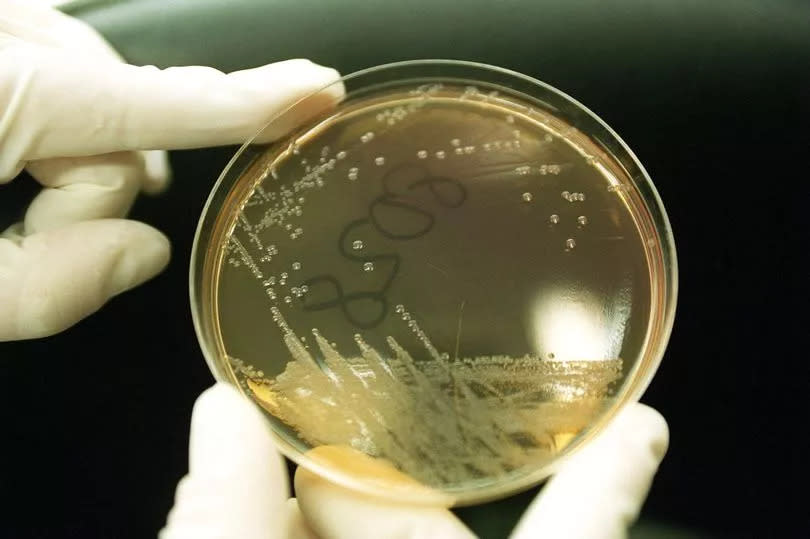Health experts confirm E.coli outbreak across UK with 113 cases and people admitted to hospital

A warning has been issued over E.Coli after health experts confirmed a UK-wide outbreak.
Whole genome sequencing of samples indicates that most of the 113 cases reported across the UK since May 25 "are part of a single outbreak", the UK Health Security Agency (UKHSA) revealed. A statement said: "Based on the wide geographic spread of cases, it is most likely that this outbreak is linked to a nationally distributed food item or multiple food items."
The source of this outbreak is not yet confirmed but there is currently no evidence linking the outbreak to open farms, drinking water or swimming in contaminated seawater, lakes or rivers. The UKHSA said it was working with public health agencies in Scotland, Northern Ireland and Wales, the Food Standards Agency (FSA) and Food Standards Scotland to determine the cause of people's illness.
Read More: New 'ultra-sensitive' blood test can predict if breast cancer will return, say researchers
All the cases recorded in the outbreak involve Shiga toxin-producing E.coli O145 (Stec), with 81 cases in England, 18 in Wales, 13 in Scotland and one person in Northern Ireland who believes they acquired Stec in England. The people who have fallen ill range in age from two to 79, with the majority of cases in young adults. Of the 81 people identified so far in England, 61 have provided information to UKHSA related to food, travel and potential exposures. Of these 61 people, 61% have been admitted to hospital.
E. coli are a diverse group of bacteria that are normally harmless and live in the intestines of humans and animals. However, some strains produce toxins that can make people very ill, such as Stec.
People infected with Stec can suffer diarrhoea, and about 50% of cases have bloody diarrhoea. Other symptoms include stomach cramps and fever. Symptoms can last up to two weeks in uncomplicated cases.
Some patients, mainly children, may develop haemolytic uraemic syndrome (HUS) which is a serious life-threatening condition resulting in kidney failure. A small proportion of adults may develop a similar condition called thrombotic thrombocytopaenic purpura (TTP).
While the source of this outbreak is currently unknown, there are steps you can take to reduce your risk of gastrointestinal infections, as well as limiting the spread to others:
regularly wash your hands with warm water and soap — alcohol gels do not kill all bugs that cause diarrhoeal illness
follow food hygiene measures such as washing fruit and vegetables and cooking food properly
if you have diarrhoea and vomiting, you should not prepare food for others and avoid visiting people in hospitals or care homes to avoid passing on the infection
you should not return to work, school or nursery until 48 hours after your symptoms have stopped
Trish Mannes, incident director at UKHSA, said: "Symptoms of infections with STEC include severe and sometimes bloody diarrhoea, stomach cramps, vomiting and fever. If you have diarrhoea and vomiting, you can take steps to avoid passing it on to family and friends. NHS.UK has information on what to do if you have symptoms and when to seek medical advice.
"Washing your hands with soap and warm water and using disinfectants to clean surfaces will help stop infections from spreading. If you are unwell with diarrhoea and vomiting, you should not prepare food for others and avoid visiting people in hospitals or care homes to avoid passing on the infection in these settings. Do not return to work, school or nursery until 48 hours after your symptoms have stopped."
Darren Whitby, head of incidents and resilience at the FSA, added: "The FSA is working with UKHSA and relevant Public Health bodies to identify the source of the illness, which is likely to be linked to one or more food items. We always advise consumers and those looking after vulnerable people to ensure good hygiene practices are followed when handling and preparing food, regularly washing hands with soap and warm water and ensuring equipment, utensils and surfaces foods come into contact with are cleaned thoroughly to prevent cross contamination.
"You should not prepare food for others if you have had symptoms, or for 48 hours after symptoms stop. You can find more information about good hygiene practises – 4c’s, and E.coli on our website."

 Yahoo News
Yahoo News 
